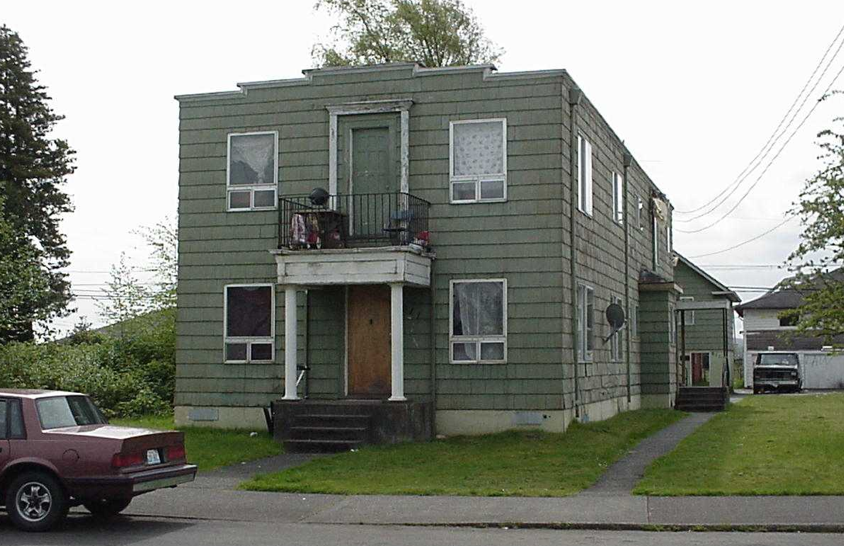
FROM MY FILES FRIDAY: Regular readers might have noticed that I didn’t post an original blog on Monday this week. That is because I have been in the hospital with my mom who is 94 and is undergoing testing for severe pains in her back. I hope to get back on schedule next week. Thanks for your patience.
Meanwhile, here is a blog that first appeared on May 9, 2011, and unfortunately is still germane. The more that I have traveled, the more convinced that I have become that providing adequate housing in a community to persons with sereve mental illnesses is crucial to their recovery. Sadly, what they often get is substandard treatment in slum dwellings.
FROM SHODDY HOSPITALS TO SHODDY HOUSING
The main reason why I wrote CRAZY was to expose how thousands of persons with severe mental illnesses are being locked-up in jails and prisons because of inadequate community services and laws that require a person to be dangerous before they can be helped.
To me, the incarceration of persons whose only real crime is that they have become ill is a national scandal.
Of course, not everyone with a severe mental disorder in Miami, where I did my research, ended up in jail. When I did my investigation, there were 4,500 persons with severe mental disorders living in 650 boarding homes, called Assisted Living Facilities. At one time, most of these folks would have confined in state hospitals. Now they are in the community — which is wonderful.
Wonderful, that is, until you explore the conditions under which many of them are living today.
Of the 650 boarding homes that existed when I did my research — 400 could not pass the state’s minimum standards for operating as licensed ALFs. They were granted special waivers. What that means is Florida waived important safeguards that it normally required because it was desperate for somewhere to house persons with mental disorders.
I remember walking into one ALF in Miami and discovering a hole in the roof that rain poured through, psychotropic medications were scattered across a kitchen table, the ALF’s caretaker only spoke Spanish, none of the tenants spoke Spanish. Meals were rice and beans. There was no serious case management, no therapy, no recreation, no jobs, no crafts, there was nothing for tenants to do but sit around smoking cigarettes and watching television.
After my book was published, an owner of an ALF complained. He pointed out that he received $29.90 per day from local, state and federal resources for each tenant. That $29.90 had to cover all of a person’s food, clothing, medication — everything.
That complaint caused me to call my local animal kennel and I discovered that it charged $34 per day to take care of a dog. In other words, pet owners were paying $4 more per day to take care of their dogs than what we were paying AFL owners to care for persons with severe mental disorders.
It irritates me when mental health advocates push for the wholesale closing of all state facilities but then turn a blind eye to the horrific community facilities where persons with severe illnesses are being sent. I’m not claiming that our old hospital system was better. What I am saying is that simply moving a person into a community doesn’t guarantee that he/she will get any better care.
Because of my book and the tireless efforts of Miami-Dade Mental Health Court Judge Steve Leifman to improve conditions in Miami Dade County, I assumed that most of the problems that I witnessed at ALF facilities would get resolved.
But The Miami Hearld posted an expose last week that documented the same sort of conditions that I observed six years ago. If anything, it appears conditions have gotten worse!
“It’s a cheap, easy, unregulated system of care,” Judge Leifman told the Herald. Leifman has been so disgusted by conditions at ALF’s that he has refused to send some persons with mental illnesses from jail into ALF housing. Some of the ALF’s are more dangerous than the jail!
The Herald reporters found that reports of abuse filed with the Agency for Health Care Administration, which is entrusted with overseeing the facilites, were routinely ignored, leaving residents at the mercy of shoddy operators.
The newspaper found ALF residents were nearly twice as likely to be beaten, sexually abused, or molested as someone without a mental illness in an ALF.
Regulators caught nearly 100 homes using illegal restraints, including doping residents with tranquilizers without doctor’s approval, tying them with ropes in beds and chairs, and locking them in isolation rooms.
Caretakers were routingly caught intoxicated, asleep and even abandoning their posts entirely, often with severe consequences to residents. At one ALF, fellow residents called the police when one of the other residents was dying from a drug overdose. The caretaker had locked the office door and was taking a nap at the time.
Where is the outrage from the mental health lawyers who were so critical of state hospitals? Where are the protection and advocacy investigators whose jobs were created by Congress to protect consumers back when they were being housed in state hospitals?
I am grateful to the Herald reporters! I hope other newspapers follow the Herald’s example because what is happening in Florida with ALFs is happening in other states as well.
In these incidents, we are have not improved the lives of persons with severe mental illnesses by taking them out of state hospitals. We are just hiding them better in our communities.



